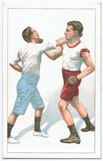 |
TOURNAMENT ROUND 3
APRIL 7, 2006 JUDGED BY BRIGID HUGHES
|
 |
I’ll admit to be being a bit intimidated by Home Land. I’d heard such good things about it, and even before I’d read it I had recommended it to a friend with similar tastes. Apparently, that’s the last recommendation she’ll be taking from me; she had a really hard time with it, and found the protagonist way too unpleasant. It’s something I’ve been thinking about a lot recently: Can unsympathetic characters be compelling? Do I like books with unpleasant characters? Or am I like the people in a recent survey who wanted to rewrite Tess of the D’Urbervilles to give it a happy ending?
So I was somewhat surprised to find myself taken with the story of Lewis Miner, member of the class of ‘89, the guy who “did not pan out.” I wouldn’t say I particularly liked him. He can be unpleasant; he’s certainly an overwhelming presence, and spending so much time with him takes a lot out of you.
How does Sam Lipsyte get me to care about such a flawed person? Darned if I can figure it out. Teabag is this big wreck of a character, with his manic letters to the alumni magazine, his disaster of a life. But his story felt more full of life than a lot of likable characters I’ve read lately.
So I was somewhat surprised to find myself taken with the story of Lewis Miner, member of the class of ‘89, the guy who “did not pan out.” I wouldn’t say I particularly liked him. He can be unpleasant; he’s certainly an overwhelming presence, and spending so much time with him takes a lot out of you.
How does Sam Lipsyte get me to care about such a flawed person? Darned if I can figure it out. Teabag is this big wreck of a character, with his manic letters to the alumni magazine, his disaster of a life. But his story felt more full of life than a lot of likable characters I’ve read lately.
How does Sam Lipsyte get me to care about
such a flawed person? Darned if I can
figure it out.
The History of Love is an exquisite book—at its best, the type of novel I wanted to read with a pen in hand so I could underline sentences, star paragraphs. But, and I think this is especially true when read alongside Home Land, the characters and their stories feel constructed, not lived in. I wouldn’t be all surprised to bump into Lewis Miner in the grocery store, but I can’t see Leo Gursky existing off the pages of The History of Love. I guess at the end of the day, at least this day, I’ll take life over art.such a flawed person? Darned if I can
figure it out.
MATCH WINNER!!!
HOME LAND by SAM LIPSYTE
Click here to read Kevin Guilfoile & John Warner’s commentary on this match from the booth!